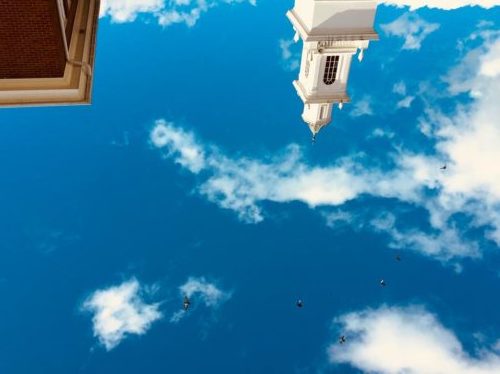
The Upside Down Kingdom
Ten at night on a university campus. My feet hurt. I shivered in my thin sweater. My bag weighed about a thousand pounds. I had asked three students for directions, but I still couldn’t find the parking garage where my minivan was parked. Someone walked behind me. Closer than social protocol required. At the stop sign, I turned and saw a teenage boy with special needs.
I asked, “Can you tell me where the parking garage is?”
He smiled, adjusting his headphones. His glasses winked beneath the streetlight. “Right over there,” he said, pointing straight ahead.
Thanking him, I kept walking. I found the parking garage and looked for my van: walking the first level and then the second. In desperation, I pressed the panic button on my key fob but heard no sound. Wrong parking garage. I continued walking, asked directions again, and as I turned a corner past a construction zone, I saw a woman in a t-shirt pushing a cleaning cart. It was cold enough to see her breath.
“Girl!” I cried. “You must be freezing!”
She smiled, and we made small talk that warmed me. I finally found my van—hitting the panic button to be sure the popular silver Dodge Caravan was mine, the sound reverberating off the cement walls—and climbed inside.
I was beginning to see a pattern.
Earlier that day, a well-known author and speaker had said that survival is our main motivation for kindness. We are kind to others so they will fight for us if invaders come over the hill (just paraphrasing here). His presentation illuminated the marketing world’s murky waters. But afterward, I became perplexed. Was Jesus’ main motivation for kindness survival?
If his main motivation for kindness had been survival, he would not have been born to die. His main motivation for kindness was to reveal his father’s love.
Today, I taught Sunday school with my husband. I didn’t see the curriculum, “Kids Carrying the Kingdom,” until I stood before the little podium and read the verses aloud. My heart beat harder as I read, for it confirmed what I’d felt in my spirit:
The Kingdom of God says, “If we lose our life, we’ll find it.” Matthew 1:25
The world says, “That doesn’t make sense.”
The Bible says, “If we humble ourselves in the sight of the Lord, God will lift us up.” 1 Peter 5:6
The world says, “Don’t depend on anybody else—you’ll look weak.”
Jesus said, “That if you want to be great in God’s Kingdom, be a servant to all.” Mark 10:44
The world says, “Use other people, take advantage of them to get ahead.”
The world says, “Seek first the Kingdom of God, and everything will be added to you.” Matthew 6:33
The kingdom of the world says, “Do everything for yourself.”
The kingdom of God is an upside-down construction: To be great, be a servant. To find your life, lose it. To be lifted up, lower yourself. We must come to him as a child in order to understand.
I ad-libbed my way through the curriculum, but then I saw a hand mirror in the basket of supplies. I took that mirror and passed it to the boy on the left. I said, “I want you all to pass that mirror down. But before you do, I want you to look in that mirror and say, ‘God loves me.’”
What I love about the age of the children I teach is that they aren’t too concerned about what other people think. The boy took the mirror and held it up. Looking right at himself, he said, “God loves me.”
He passed the mirror. The girl next to him held it up. “God loves me.”
They passed it down the row and then down the row behind them: God loves me; God loves me; God loves me. By the time it reached the end, I was fighting back tears.
In that mirror, I saw an image of what I want to do with my life.
I don’t want to be kind only for survival. I want to be kind to be a mirror, reflecting Jesus’ love back to them, so they can then find him and reflect that love back to others.
Did that teenage boy with special needs stop and offer me directions because he thought I had something to offer? No, he did not. Did that cleaning woman stop and talk to me because she thought I had something to offer? No, she did not.
They helped me . . . they talked to me . . . because they were kind.
When Jesus walked the earth, he was drawn to the marginalized because, like those children in my Sunday school class, they weren’t too concerned about what other people thought, so they easily accepted him and his upside-down kingdom.
Will you join me on this quest for an upside-down kingdom, where we aren’t busy making a name for ourselves, but we’re busy proclaiming his name to the least of these? I want to live in an upside-down kingdom where Jesus becomes clearer the more my own image fades. One day, I hope to look in the mirror and all I see is him.
How are you going to reflect Jesus’ love this week?



